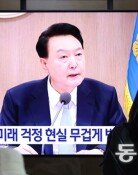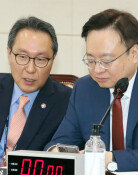S. Korea and U.S. must go together for peace on Korean Peninsula
S. Korea and U.S. must go together for peace on Korean Peninsula
Posted August. 18, 2017 07:25,
Updated August. 18, 2017 07:52
“The most central and the largest stakeholder of North Korea’s nuclear and missile programs is South Korea,” said President Moon Jae-in during a press conference on Thursday. “The spirit of the ROK-U.S. alliance is such that the U.S. should consult with South Korea in advance, even when it is taking military action outside the Korean Peninsula if doing so might lead to escalation of tensions of inter-Korean relations.” He also said that U.S. President Donald Trump had promised to seek agreement from South Korea first in implementing any military option on North Korea.
However, a CNN reporter questioned if the two countries are sharing the same stance, citing President Trump’s remarks of military action and the mentioning of “fire and fury." Even the media outlets in the U.S. are voicing concerns that the two allies are experiencing new, strained relations, in regard to President Moon’s remarks to celebrate South Korea’s Liberation Day that “No one can decide military action without the consent of South Korea.” The Wall Street Journal interpreted Moon’s remark as “a warning to the U.S.,” adding that consensus has yet to be built even among experts on whether the U.S. is legally obligated to seek approval from Seoul for military action when its own national security is on the line.
The Trump administration is considering both hawkish and dovish action plans, with the proposal of dialogue from the Department of State and that of military options from the Department of Defense on the table. On Wednesday, the U.S. Department of State said that it is willing to talk with North Korea, urging Pyongyang to give up on nuclear tests and test-firing of ballistic missiles and put a halt to such provocative rhetoric as “a plan to strike Guam,” as a precondition of dialogue.
Though the deal came with the prerequisite that the North cannot be recognized as a nuclear state and that change of attitude must be preceded, this marks the first time that the State Department has proposed detailed conditions for a dialogue with the communist regime. As to the North’s decision not to fire missiles towards Guam, U.S. President Trump said, “Kim Jong Un made a very wise and well reasoned decision.” This suggests a possibility that talks might be held between the Washington and Pyongyang just by suspending North Korea’s nuclear and missile tests without making the regime state clear intention to dismantle its nuclear program.
On Wednesday, U.S. Chairman of the Joint Chiefs of Staff Joseph Dunford paid a visit to the Northern Theatre Command in Shenyang, Liaoning, which will send troops first to Korea in case of emergency on the peninsula, and watched the military exercise of Chinese soldiers. A day before, Dunford had met with Gen. Fang Fenghui, chief of China’s Joint Staff, and experts say the two may have exchanged close consultations on various issues, ranging from the option of the U.S. striking the North to a sudden shift of situation in North Korea.
It would be most ideal if the Moon administration could prevent war on the Korean Peninsula only through dialogue. But the South is not making any progress on that front as the North is not even recognizing Seoul as a subject of dialogue, let alone responding to the request. Going beyond repeating “anti-war” rhetoric, the South Korean government should discuss the action plans proposed by the U.S. together based on strong cooperation. The symbolic phrase of the ROK-U.S. alliance could not be more apt now. We should “go together."







